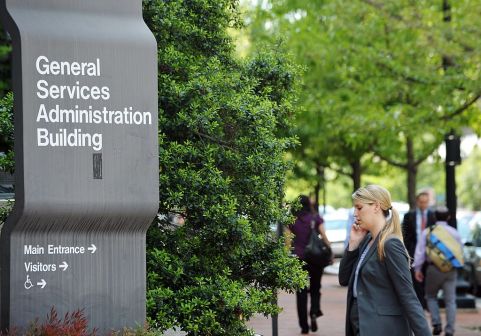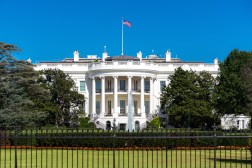 President Barack Obama delivers a statement to the press in the James S. Brady Press Briefing Room of the White House. (Photo: White House/Chuck Kennedy)
President Barack Obama delivers a statement to the press in the James S. Brady Press Briefing Room of the White House. (Photo: White House/Chuck Kennedy) Congressional leaders avoided the fiscal cliff on Tuesday when the House passed the American Taxpayer Relief Act of 2012 that calls, in short, for tax increases to everyone but the wealthiest citizens and reduces the federal deficit by $737 billion.
To help better understand the agreement, FedScoop created a short guide to summarize the bill and its impact on the country.
The vote
The Senate voted 89-8 in a roll call vote in the early hours of New Year’s Day. The House passed the measure Tuesday night 257-167 with 172 Democrats and 85 Republicans making up the Republican-ran House’s vote.
The details
The meat of the bill prevents most income tax rates from reverting to pre-Bush administration levels, something estimated to save the typical family of four from a $3,500 a year tax increase. The bill does raise taxes on the country’s wealthiest individuals. The tax rate jumps to 39.6 percent from 35 percent to individual incomes exceeding $400,000 and $450,000 for couples.
Quotable
President Obama, speaking to reporters on New Year’s Eve:
Under this law, more than 98 percent of Americans and 97 percent of small businesses will not see their income taxes go up. Millions of families will continue to receive tax credits to help raise their kids and send them to college. Companies will continue to receive tax credits for the research that they do, the investments they make, and the clean energy jobs that they create. And 2 million Americans who are out of work but out there looking, pounding the pavement every day, are going to continue to receive unemployment benefits as long as they’re actively looking for a job.
But I think we all recognize this law is just one step in the broader effort to strengthen our economy and broaden opportunity for everybody. The fact is the deficit is still too high, and we’re still investing too little in the things that we need for the economy to grow as fast as it should.
And that’s why Speaker Boehner and I originally tried to negotiate a larger agreement that would put this country on a path to paying down its debt while also putting Americans back to work rebuilding our roads and bridges, and providing investments in areas like education and job training. Unfortunately, there just wasn’t enough support or time for that kind of large agreement in a lame duck session of Congress. And that failure comes with a cost, as the messy nature of the process over the past several weeks has made business more uncertain and consumers less confident.
Statement from Rep. John Boehner, the Speaker of the House:
The federal government has a spending problem that has led to a $16 trillion national debt that threatens our country’s future. On the day after the election, I proposed that both parties work together to avert the fiscal cliff in a manner that would ensure 2013 is the year we finally enact entitlement reform and pro-growth tax reform to begin to solve our country’s debt problem.
Now the focus turns to spending. The American people re-elected a Republican majority in the House, and we will use it in 2013 to hold the president accountable for the ‘balanced’ approach he promised, meaning significant spending cuts and reforms to the entitlement programs that are driving our country deeper and deeper into debt.
“Without meaningful reform of entitlements, real spending controls, and a fairer, cleaner tax code, our debt will continue to grow, and our economy will continue to stumble. Republicans stand for a stronger, more prosperous America, rich in opportunity and free of the debt that threatens our children’s future. On this New Year’s Day, we renew our commitment to that vision, humbled by the opportunity to serve.”
The Deficit
The bill reduces deficit by $737 billion and spending by $107 billion. The deficit reduction is made up of the following numbers, according to the Office of Management and Budget:
- $618 billion due to higher taxes on the highest-income Americans and the wealthiest estates.
- $22 billion due to reductions in discretionary spending and a change to tax-preferred savings accounts that pay for turning off sequestration for two months.
- $24 billion in various health measures that pay for turning off the SGR for one year. (Because sequestration and the SGR are turned off in the CBO current policy baseline, these pay-fors reduce deficits relative to that baseline.)
- The above provisions more than offset the $30 billion cost of the measure’s one-year extension of emergency unemployment insurance benefits, resulting in $630 billion of net non-interest deficit reduction.
- Another $104 billion of deficit reduction results from lower interest payments on the federal debt, for a total of $737 billion in deficit reduction.
Video
Sequestration
Under the agreement, the sequestration negotiations have been delayed 60 days to give Congress more time to act on coming up with a federal deficit spending plan. If a plan is not reached by the new deadline, the federal government would face $1.2 trillion in across-the-board cuts over the next decade.
According to the White House, the postponement is paid for with $1 of revenue for every $1 of spending, with the spending balanced between defense and domestic agencies.
In total, the agreement saves $24 billion, according to the White House, with half coming in revenue and half from spending cuts, which are divided equally between defense and nondefense.
More information
The White House released a fact sheet further outlining the agreement.






